Professional Identity, Standards, and Quality in Nursing
VerifiedAdded on 2021/02/21
|7
|1631
|70
Essay
AI Summary
This essay provides a comprehensive overview of the nursing profession, emphasizing the significance of professional identity, industry standards, and quality assurance. It defines professional identity within the context of healthcare, highlighting the importance of core values, ethical conduct, and continuous development for nurses. The essay identifies key agencies and associations, such as the NMBA, that set standards, guidelines, and codes of practice, crucial for ensuring safe and effective nursing care. It explains how these standards guide professional practice and the provision of quality care, including person-centered practice, cultural sensitivity, and professional behavior. Furthermore, the essay details the mechanisms through which industry and professional agencies monitor the quality of care and services provided by nurses, ensuring public safety and adherence to ethical standards. The discussion underscores the importance of these elements in shaping the nursing profession and maintaining its integrity.

HOUSING
Paraphrase This Document
Need a fresh take? Get an instant paraphrase of this document with our AI Paraphraser
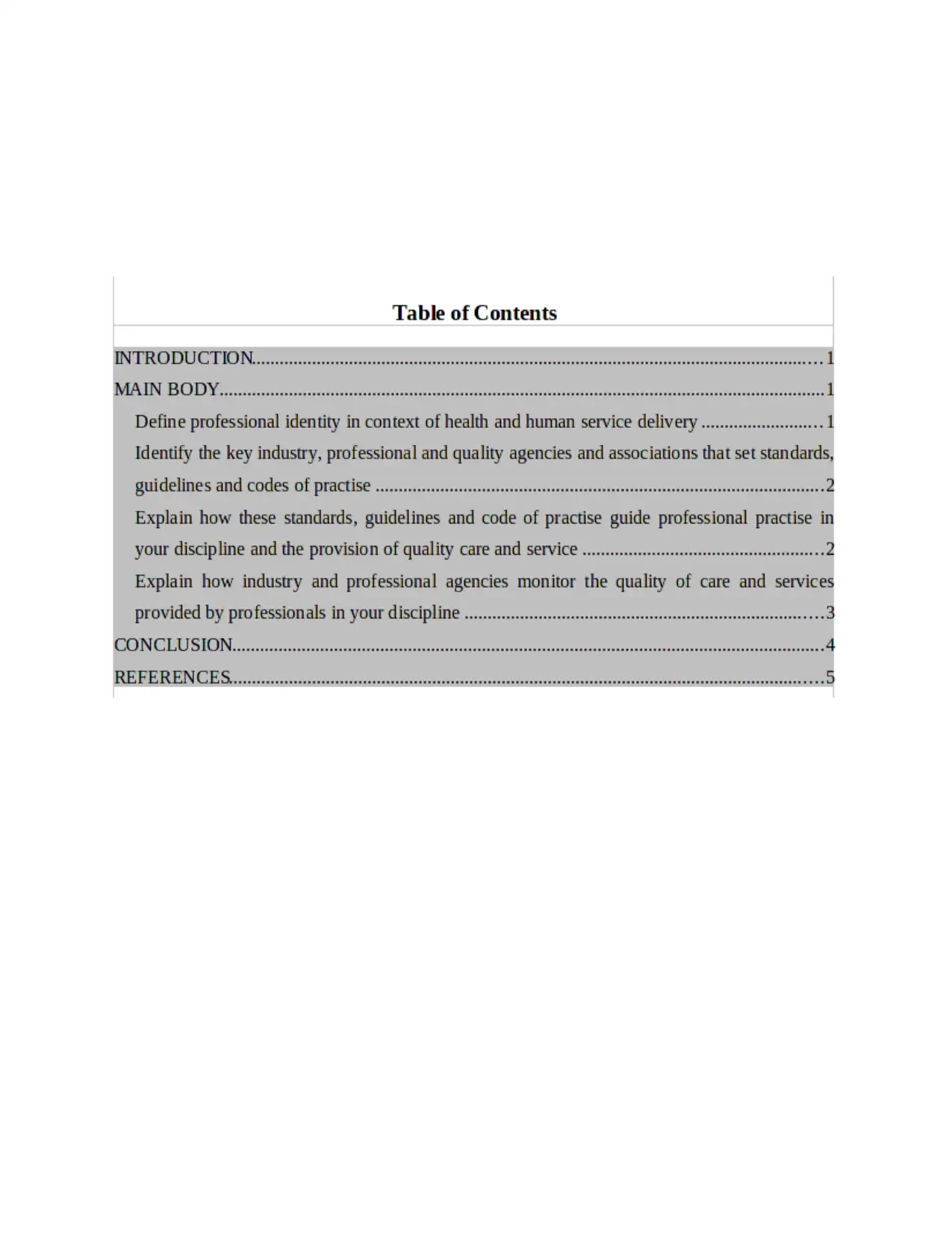
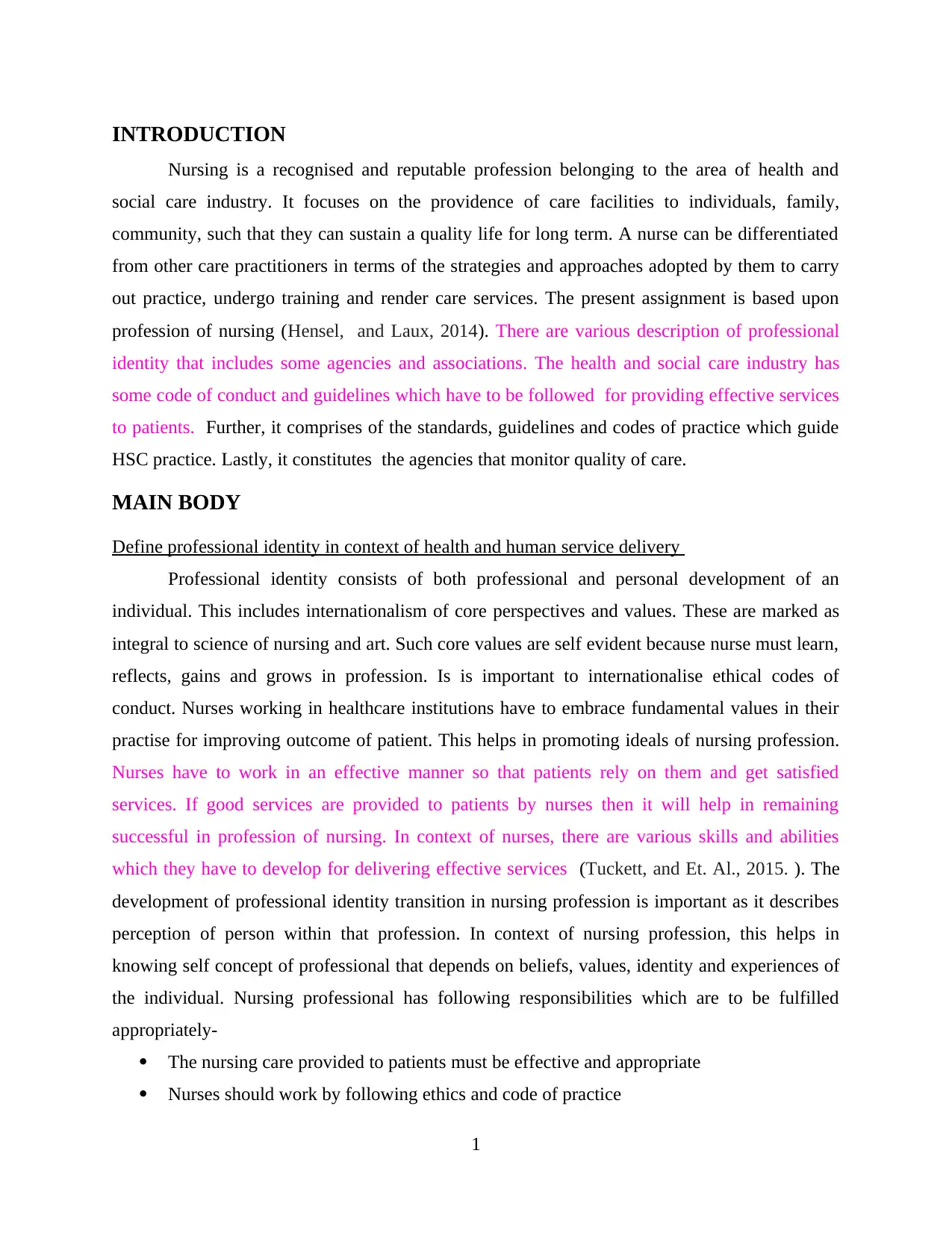
INTRODUCTION
Nursing is a recognised and reputable profession belonging to the area of health and
social care industry. It focuses on the providence of care facilities to individuals, family,
community, such that they can sustain a quality life for long term. A nurse can be differentiated
from other care practitioners in terms of the strategies and approaches adopted by them to carry
out practice, undergo training and render care services. The present assignment is based upon
profession of nursing (Hensel, and Laux, 2014). There are various description of professional
identity that includes some agencies and associations. The health and social care industry has
some code of conduct and guidelines which have to be followed for providing effective services
to patients. Further, it comprises of the standards, guidelines and codes of practice which guide
HSC practice. Lastly, it constitutes the agencies that monitor quality of care.
MAIN BODY
Define professional identity in context of health and human service delivery
Professional identity consists of both professional and personal development of an
individual. This includes internationalism of core perspectives and values. These are marked as
integral to science of nursing and art. Such core values are self evident because nurse must learn,
reflects, gains and grows in profession. Is is important to internationalise ethical codes of
conduct. Nurses working in healthcare institutions have to embrace fundamental values in their
practise for improving outcome of patient. This helps in promoting ideals of nursing profession.
Nurses have to work in an effective manner so that patients rely on them and get satisfied
services. If good services are provided to patients by nurses then it will help in remaining
successful in profession of nursing. In context of nurses, there are various skills and abilities
which they have to develop for delivering effective services (Tuckett, and Et. Al., 2015. ). The
development of professional identity transition in nursing profession is important as it describes
perception of person within that profession. In context of nursing profession, this helps in
knowing self concept of professional that depends on beliefs, values, identity and experiences of
the individual. Nursing professional has following responsibilities which are to be fulfilled
appropriately-
The nursing care provided to patients must be effective and appropriate
Nurses should work by following ethics and code of practice
1
Nursing is a recognised and reputable profession belonging to the area of health and
social care industry. It focuses on the providence of care facilities to individuals, family,
community, such that they can sustain a quality life for long term. A nurse can be differentiated
from other care practitioners in terms of the strategies and approaches adopted by them to carry
out practice, undergo training and render care services. The present assignment is based upon
profession of nursing (Hensel, and Laux, 2014). There are various description of professional
identity that includes some agencies and associations. The health and social care industry has
some code of conduct and guidelines which have to be followed for providing effective services
to patients. Further, it comprises of the standards, guidelines and codes of practice which guide
HSC practice. Lastly, it constitutes the agencies that monitor quality of care.
MAIN BODY
Define professional identity in context of health and human service delivery
Professional identity consists of both professional and personal development of an
individual. This includes internationalism of core perspectives and values. These are marked as
integral to science of nursing and art. Such core values are self evident because nurse must learn,
reflects, gains and grows in profession. Is is important to internationalise ethical codes of
conduct. Nurses working in healthcare institutions have to embrace fundamental values in their
practise for improving outcome of patient. This helps in promoting ideals of nursing profession.
Nurses have to work in an effective manner so that patients rely on them and get satisfied
services. If good services are provided to patients by nurses then it will help in remaining
successful in profession of nursing. In context of nurses, there are various skills and abilities
which they have to develop for delivering effective services (Tuckett, and Et. Al., 2015. ). The
development of professional identity transition in nursing profession is important as it describes
perception of person within that profession. In context of nursing profession, this helps in
knowing self concept of professional that depends on beliefs, values, identity and experiences of
the individual. Nursing professional has following responsibilities which are to be fulfilled
appropriately-
The nursing care provided to patients must be effective and appropriate
Nurses should work by following ethics and code of practice
1
⊘ This is a preview!⊘
Do you want full access?
Subscribe today to unlock all pages.

Trusted by 1+ million students worldwide
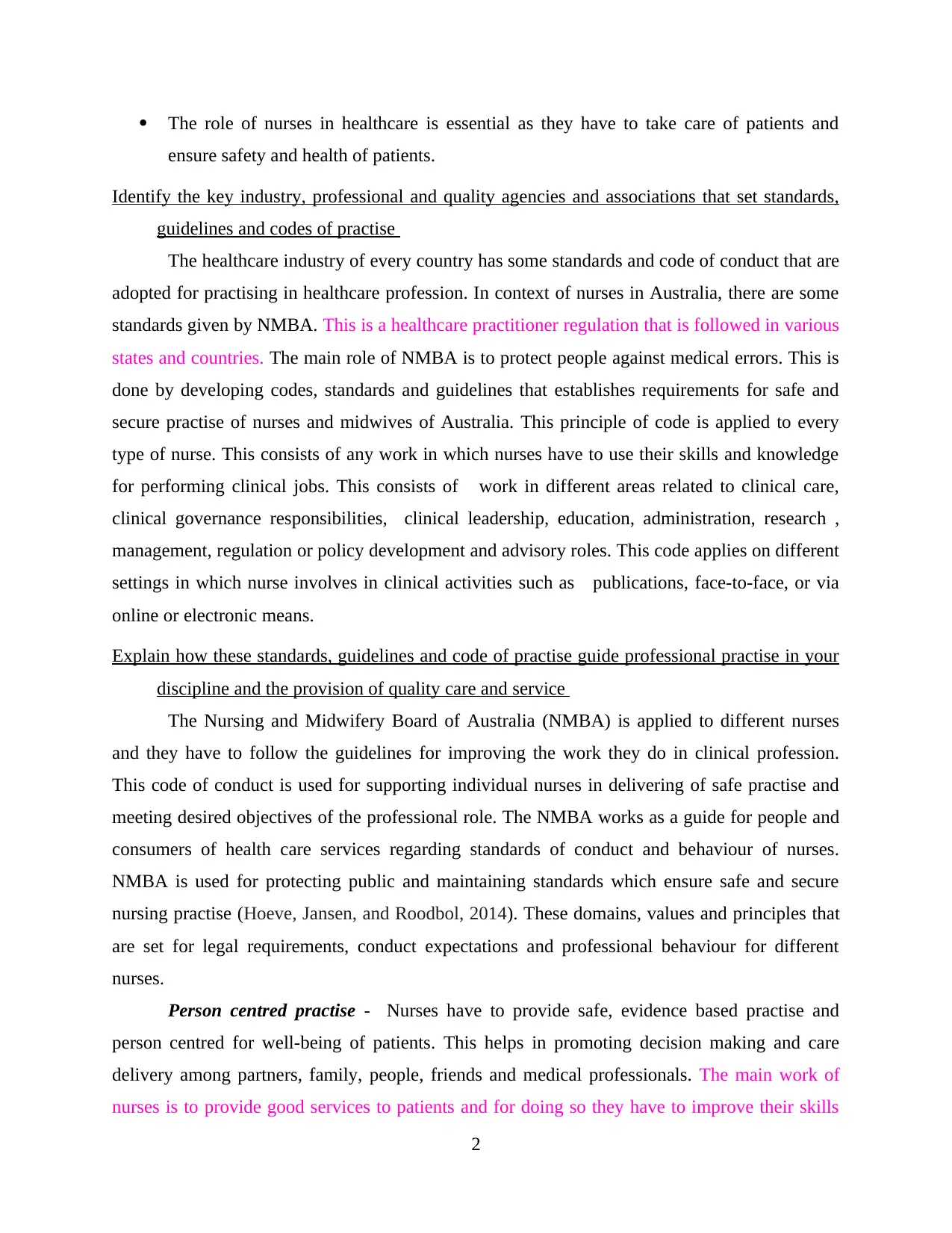
The role of nurses in healthcare is essential as they have to take care of patients and
ensure safety and health of patients.
Identify the key industry, professional and quality agencies and associations that set standards,
guidelines and codes of practise
The healthcare industry of every country has some standards and code of conduct that are
adopted for practising in healthcare profession. In context of nurses in Australia, there are some
standards given by NMBA. This is a healthcare practitioner regulation that is followed in various
states and countries. The main role of NMBA is to protect people against medical errors. This is
done by developing codes, standards and guidelines that establishes requirements for safe and
secure practise of nurses and midwives of Australia. This principle of code is applied to every
type of nurse. This consists of any work in which nurses have to use their skills and knowledge
for performing clinical jobs. This consists of work in different areas related to clinical care,
clinical governance responsibilities, clinical leadership, education, administration, research ,
management, regulation or policy development and advisory roles. This code applies on different
settings in which nurse involves in clinical activities such as publications, face-to-face, or via
online or electronic means.
Explain how these standards, guidelines and code of practise guide professional practise in your
discipline and the provision of quality care and service
The Nursing and Midwifery Board of Australia (NMBA) is applied to different nurses
and they have to follow the guidelines for improving the work they do in clinical profession.
This code of conduct is used for supporting individual nurses in delivering of safe practise and
meeting desired objectives of the professional role. The NMBA works as a guide for people and
consumers of health care services regarding standards of conduct and behaviour of nurses.
NMBA is used for protecting public and maintaining standards which ensure safe and secure
nursing practise (Hoeve, Jansen, and Roodbol, 2014). These domains, values and principles that
are set for legal requirements, conduct expectations and professional behaviour for different
nurses.
Person centred practise - Nurses have to provide safe, evidence based practise and
person centred for well-being of patients. This helps in promoting decision making and care
delivery among partners, family, people, friends and medical professionals. The main work of
nurses is to provide good services to patients and for doing so they have to improve their skills
2
ensure safety and health of patients.
Identify the key industry, professional and quality agencies and associations that set standards,
guidelines and codes of practise
The healthcare industry of every country has some standards and code of conduct that are
adopted for practising in healthcare profession. In context of nurses in Australia, there are some
standards given by NMBA. This is a healthcare practitioner regulation that is followed in various
states and countries. The main role of NMBA is to protect people against medical errors. This is
done by developing codes, standards and guidelines that establishes requirements for safe and
secure practise of nurses and midwives of Australia. This principle of code is applied to every
type of nurse. This consists of any work in which nurses have to use their skills and knowledge
for performing clinical jobs. This consists of work in different areas related to clinical care,
clinical governance responsibilities, clinical leadership, education, administration, research ,
management, regulation or policy development and advisory roles. This code applies on different
settings in which nurse involves in clinical activities such as publications, face-to-face, or via
online or electronic means.
Explain how these standards, guidelines and code of practise guide professional practise in your
discipline and the provision of quality care and service
The Nursing and Midwifery Board of Australia (NMBA) is applied to different nurses
and they have to follow the guidelines for improving the work they do in clinical profession.
This code of conduct is used for supporting individual nurses in delivering of safe practise and
meeting desired objectives of the professional role. The NMBA works as a guide for people and
consumers of health care services regarding standards of conduct and behaviour of nurses.
NMBA is used for protecting public and maintaining standards which ensure safe and secure
nursing practise (Hoeve, Jansen, and Roodbol, 2014). These domains, values and principles that
are set for legal requirements, conduct expectations and professional behaviour for different
nurses.
Person centred practise - Nurses have to provide safe, evidence based practise and
person centred for well-being of patients. This helps in promoting decision making and care
delivery among partners, family, people, friends and medical professionals. The main work of
nurses is to provide good services to patients and for doing so they have to improve their skills
2
Paraphrase This Document
Need a fresh take? Get an instant paraphrase of this document with our AI Paraphraser
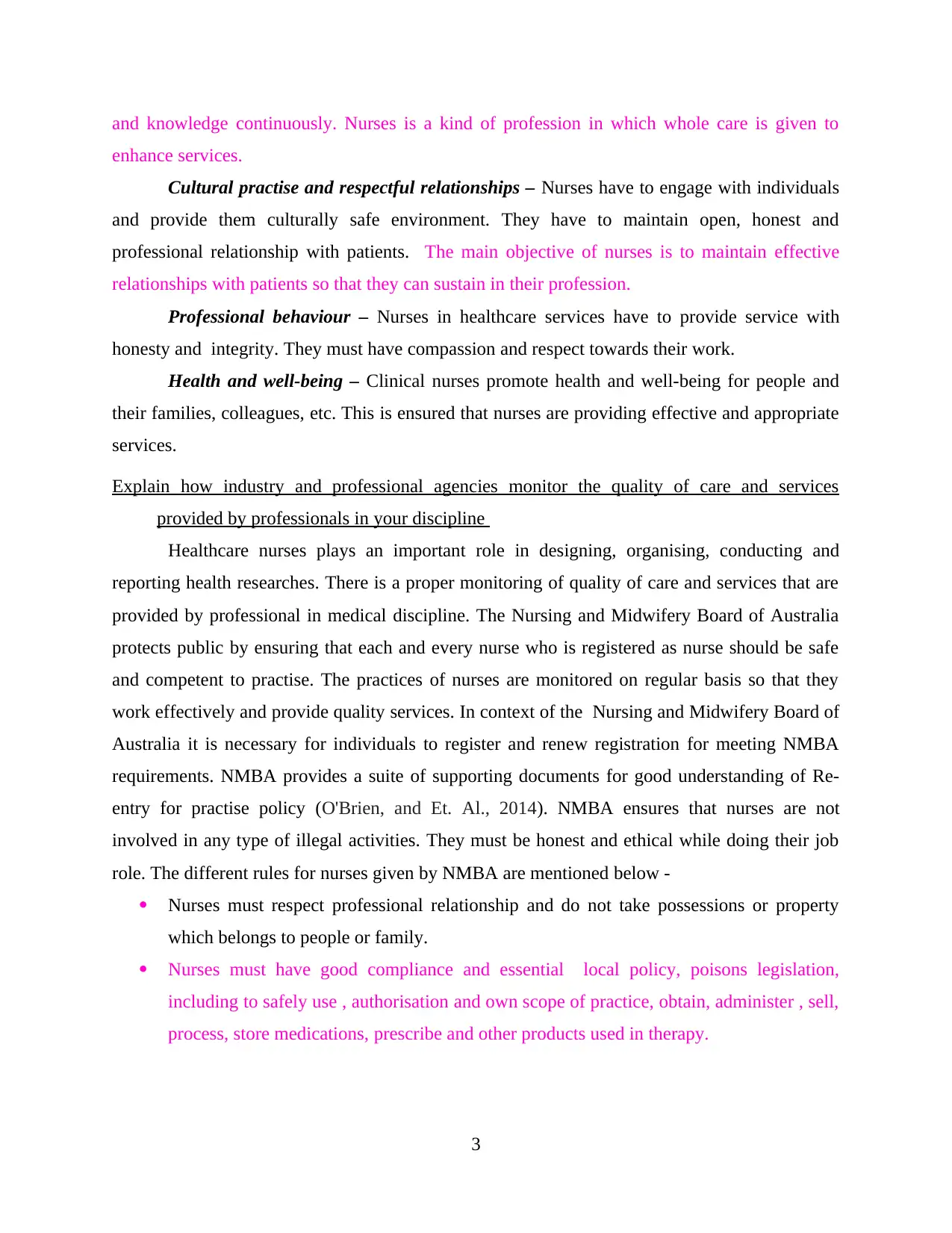
and knowledge continuously. Nurses is a kind of profession in which whole care is given to
enhance services.
Cultural practise and respectful relationships – Nurses have to engage with individuals
and provide them culturally safe environment. They have to maintain open, honest and
professional relationship with patients. The main objective of nurses is to maintain effective
relationships with patients so that they can sustain in their profession.
Professional behaviour – Nurses in healthcare services have to provide service with
honesty and integrity. They must have compassion and respect towards their work.
Health and well-being – Clinical nurses promote health and well-being for people and
their families, colleagues, etc. This is ensured that nurses are providing effective and appropriate
services.
Explain how industry and professional agencies monitor the quality of care and services
provided by professionals in your discipline
Healthcare nurses plays an important role in designing, organising, conducting and
reporting health researches. There is a proper monitoring of quality of care and services that are
provided by professional in medical discipline. The Nursing and Midwifery Board of Australia
protects public by ensuring that each and every nurse who is registered as nurse should be safe
and competent to practise. The practices of nurses are monitored on regular basis so that they
work effectively and provide quality services. In context of the Nursing and Midwifery Board of
Australia it is necessary for individuals to register and renew registration for meeting NMBA
requirements. NMBA provides a suite of supporting documents for good understanding of Re-
entry for practise policy (O'Brien, and Et. Al., 2014). NMBA ensures that nurses are not
involved in any type of illegal activities. They must be honest and ethical while doing their job
role. The different rules for nurses given by NMBA are mentioned below -
Nurses must respect professional relationship and do not take possessions or property
which belongs to people or family.
Nurses must have good compliance and essential local policy, poisons legislation,
including to safely use , authorisation and own scope of practice, obtain, administer , sell,
process, store medications, prescribe and other products used in therapy.
3
enhance services.
Cultural practise and respectful relationships – Nurses have to engage with individuals
and provide them culturally safe environment. They have to maintain open, honest and
professional relationship with patients. The main objective of nurses is to maintain effective
relationships with patients so that they can sustain in their profession.
Professional behaviour – Nurses in healthcare services have to provide service with
honesty and integrity. They must have compassion and respect towards their work.
Health and well-being – Clinical nurses promote health and well-being for people and
their families, colleagues, etc. This is ensured that nurses are providing effective and appropriate
services.
Explain how industry and professional agencies monitor the quality of care and services
provided by professionals in your discipline
Healthcare nurses plays an important role in designing, organising, conducting and
reporting health researches. There is a proper monitoring of quality of care and services that are
provided by professional in medical discipline. The Nursing and Midwifery Board of Australia
protects public by ensuring that each and every nurse who is registered as nurse should be safe
and competent to practise. The practices of nurses are monitored on regular basis so that they
work effectively and provide quality services. In context of the Nursing and Midwifery Board of
Australia it is necessary for individuals to register and renew registration for meeting NMBA
requirements. NMBA provides a suite of supporting documents for good understanding of Re-
entry for practise policy (O'Brien, and Et. Al., 2014). NMBA ensures that nurses are not
involved in any type of illegal activities. They must be honest and ethical while doing their job
role. The different rules for nurses given by NMBA are mentioned below -
Nurses must respect professional relationship and do not take possessions or property
which belongs to people or family.
Nurses must have good compliance and essential local policy, poisons legislation,
including to safely use , authorisation and own scope of practice, obtain, administer , sell,
process, store medications, prescribe and other products used in therapy.
3
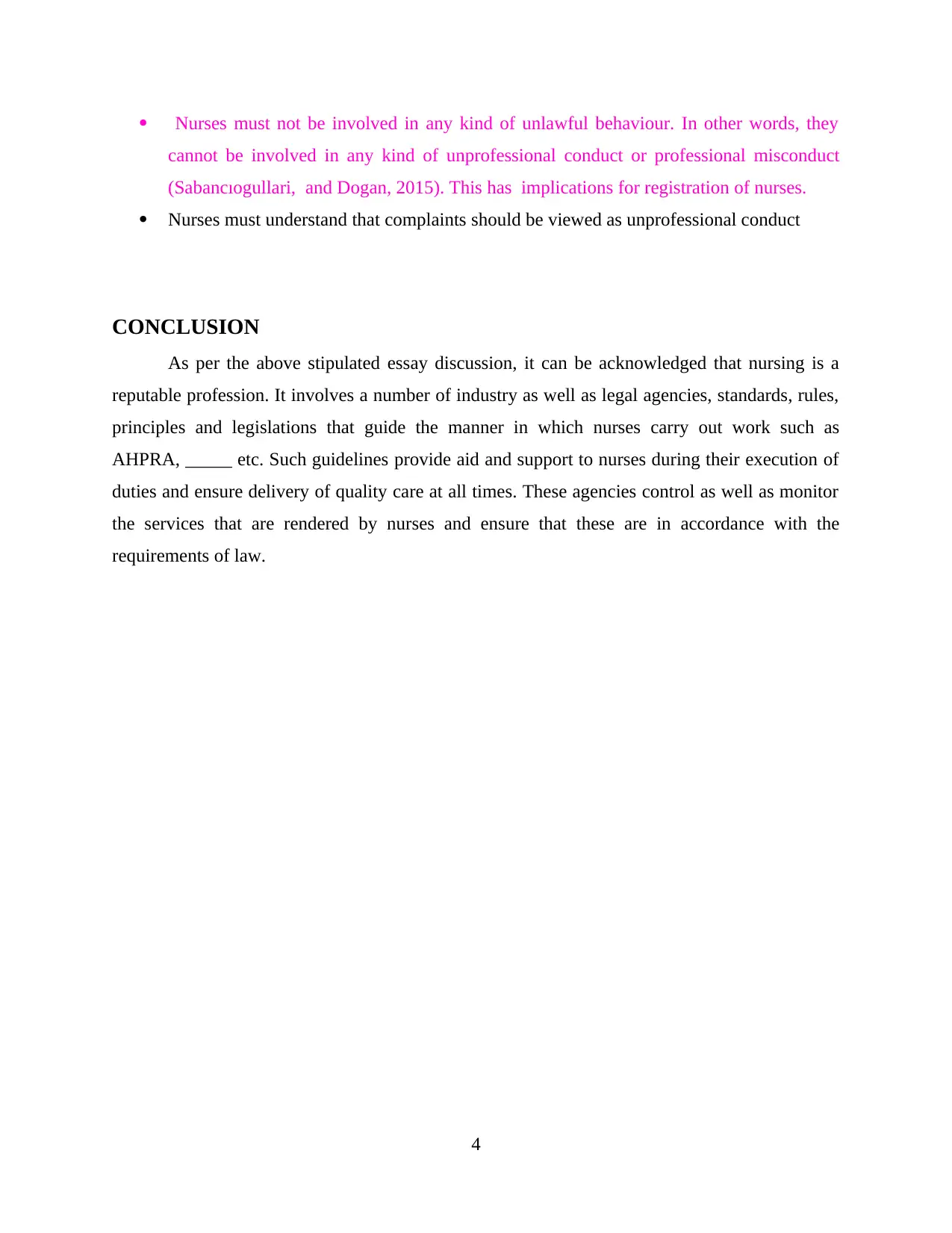
Nurses must not be involved in any kind of unlawful behaviour. In other words, they
cannot be involved in any kind of unprofessional conduct or professional misconduct
(Sabancıogullari, and Dogan, 2015). This has implications for registration of nurses.
Nurses must understand that complaints should be viewed as unprofessional conduct
CONCLUSION
As per the above stipulated essay discussion, it can be acknowledged that nursing is a
reputable profession. It involves a number of industry as well as legal agencies, standards, rules,
principles and legislations that guide the manner in which nurses carry out work such as
AHPRA, _____ etc. Such guidelines provide aid and support to nurses during their execution of
duties and ensure delivery of quality care at all times. These agencies control as well as monitor
the services that are rendered by nurses and ensure that these are in accordance with the
requirements of law.
4
cannot be involved in any kind of unprofessional conduct or professional misconduct
(Sabancıogullari, and Dogan, 2015). This has implications for registration of nurses.
Nurses must understand that complaints should be viewed as unprofessional conduct
CONCLUSION
As per the above stipulated essay discussion, it can be acknowledged that nursing is a
reputable profession. It involves a number of industry as well as legal agencies, standards, rules,
principles and legislations that guide the manner in which nurses carry out work such as
AHPRA, _____ etc. Such guidelines provide aid and support to nurses during their execution of
duties and ensure delivery of quality care at all times. These agencies control as well as monitor
the services that are rendered by nurses and ensure that these are in accordance with the
requirements of law.
4
⊘ This is a preview!⊘
Do you want full access?
Subscribe today to unlock all pages.

Trusted by 1+ million students worldwide
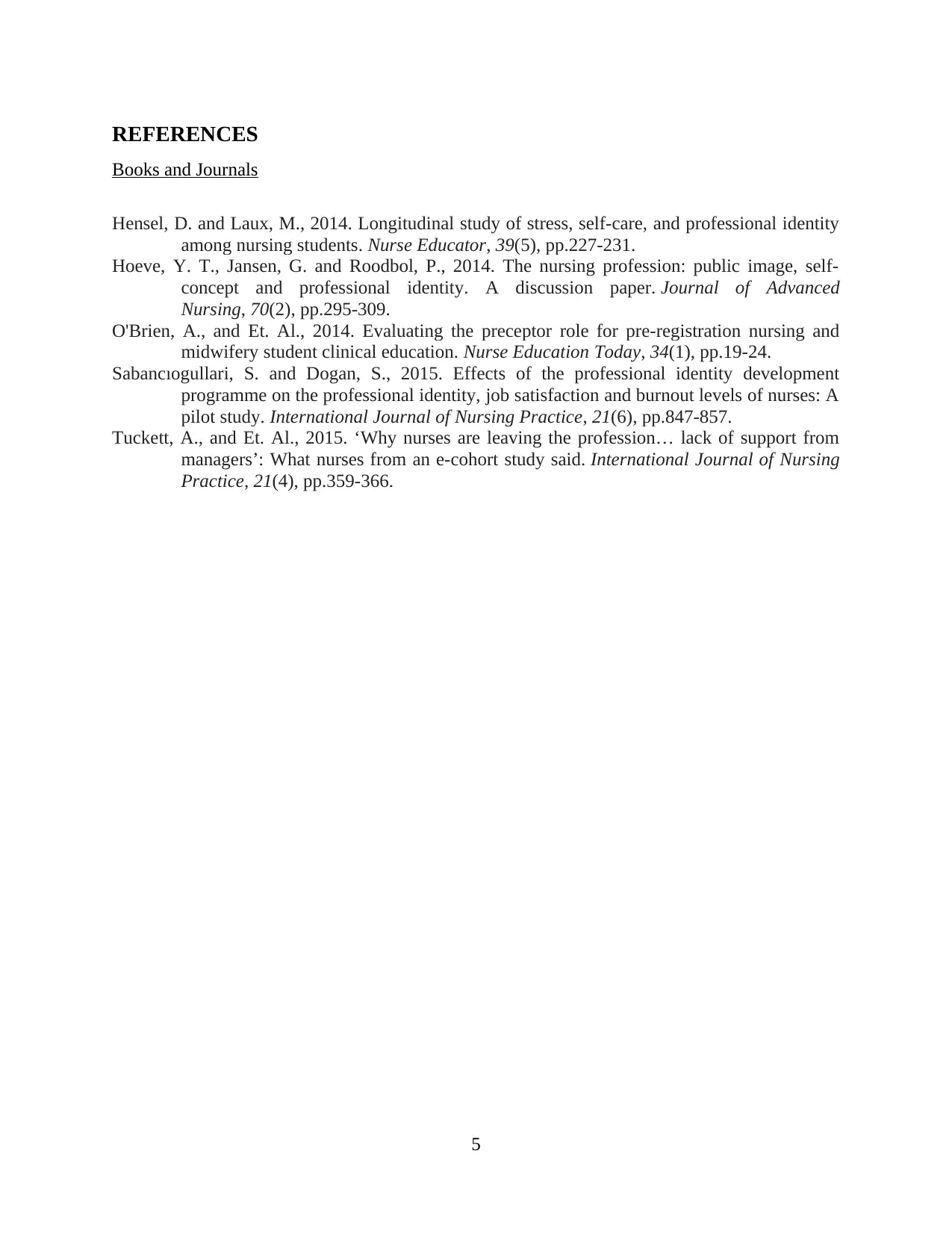
REFERENCES
Books and Journals
Hensel, D. and Laux, M., 2014. Longitudinal study of stress, self-care, and professional identity
among nursing students. Nurse Educator, 39(5), pp.227-231.
Hoeve, Y. T., Jansen, G. and Roodbol, P., 2014. The nursing profession: public image, self‐
concept and professional identity. A discussion paper. Journal of Advanced
Nursing, 70(2), pp.295-309.
O'Brien, A., and Et. Al., 2014. Evaluating the preceptor role for pre-registration nursing and
midwifery student clinical education. Nurse Education Today, 34(1), pp.19-24.
Sabancıogullari, S. and Dogan, S., 2015. Effects of the professional identity development
programme on the professional identity, job satisfaction and burnout levels of nurses: A
pilot study. International Journal of Nursing Practice, 21(6), pp.847-857.
Tuckett, A., and Et. Al., 2015. ‘Why nurses are leaving the profession… lack of support from
managers’: What nurses from an e‐cohort study said. International Journal of Nursing
Practice, 21(4), pp.359-366.
5
Books and Journals
Hensel, D. and Laux, M., 2014. Longitudinal study of stress, self-care, and professional identity
among nursing students. Nurse Educator, 39(5), pp.227-231.
Hoeve, Y. T., Jansen, G. and Roodbol, P., 2014. The nursing profession: public image, self‐
concept and professional identity. A discussion paper. Journal of Advanced
Nursing, 70(2), pp.295-309.
O'Brien, A., and Et. Al., 2014. Evaluating the preceptor role for pre-registration nursing and
midwifery student clinical education. Nurse Education Today, 34(1), pp.19-24.
Sabancıogullari, S. and Dogan, S., 2015. Effects of the professional identity development
programme on the professional identity, job satisfaction and burnout levels of nurses: A
pilot study. International Journal of Nursing Practice, 21(6), pp.847-857.
Tuckett, A., and Et. Al., 2015. ‘Why nurses are leaving the profession… lack of support from
managers’: What nurses from an e‐cohort study said. International Journal of Nursing
Practice, 21(4), pp.359-366.
5
1 out of 7
Related Documents
Your All-in-One AI-Powered Toolkit for Academic Success.
+13062052269
info@desklib.com
Available 24*7 on WhatsApp / Email
![[object Object]](/_next/static/media/star-bottom.7253800d.svg)
Unlock your academic potential
Copyright © 2020–2026 A2Z Services. All Rights Reserved. Developed and managed by ZUCOL.





